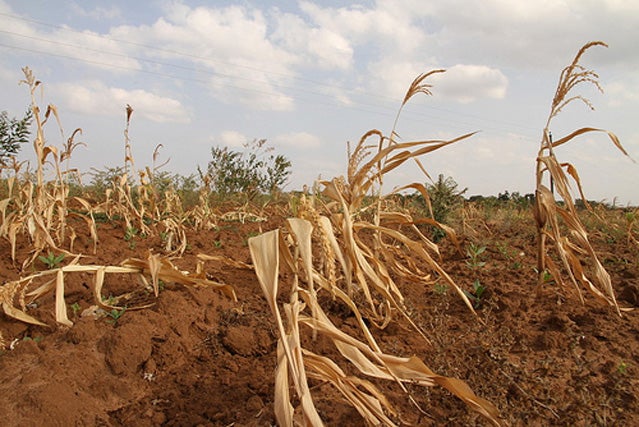It looks like we’re in for a hot summer. From parched Midwest cornfields to a confrontation-filled Austin courthouse, temperatures and tempers are rising nationwide. Yeah, the record-setting heat wave is so last week, but it looks like there’s no reprieve in sight.
And the craziness isn’t just limited to home. Flash flooding left 172 dead in Russia and threatens to become Putin’s Katrina. Meanwhile, militants have destroyed a UNESCO World Heritage site in Timbuktu. And the Persian Gulf isn’t getting any cooler as the U.S. sends in unmanned submarines and a floating command center.
On the heels of a very hot July 4th midweek holiday (oh, the joys of two Fridays in one week), we were hoping for a slightly less disaster-filled week. But then, where would the world be without some turmoil or pessimism?
Thankfully, there is good news to report. A pesky MIT grad student has invented real life truth goggles that can fact-check any article you’re reading. Unfortunately, truth is limited to whatever PolitiFact says it is. I suppose, though, there are worse things in the world.
Fact check this: Another reason to be chipper; languages might be disappearing, but Google is joining the fight to preserve them. And in even better news, we’ve finally figured out why men wear pants. But like lots else these days, it has to do with war. And horses. Which is why it’s a good thing (the horse angle, that is).
To continue on the surprising things trend, it turns out that Israel has found gas deposits off its coast. It’s hard to say whether this is a good or bad thing for peace (and the outdoors, because we know what good oil spills can do), but it’s happening.
We thought nothing would surprise us more than to learn that the land of milk, honey and bloodshed is flowing with oil, but something has; the leader of the Tour is suspected of doping and lashing out at his Twitter critics (Twittics?). Thankfully, he has a well-established defense. He’s very talented, ergo his success shouldn’t come as a shock.
Naturally, I agree. Anyone comparing Wiggins to Lance is far too sane to argue with. Everyone knows that Wiggins’ team is utterly dominating the race, but that’s OK because Wiggins was a child prodigy who never focused on the Tour but got insanely good at it as soon as he lost a few kilos and did really well at the Vuelta. Sound familiar?
You wouldn’t be an idiot for buying into that. But even if you are one, that’s OK, according to the Economist. Apparently, being dim-witted does have its advantages afterall.
With no more editorializing on our part, here are the week’s must-read stories:
Not that this should scare you or anything, but it looks like your chicken dinner is creating a drug-resistant superbug. Say hello to some nasty urinary tract infections. Maryn McKenna, The Atlantic.
“But the origin of these newly resistant E. coli has been a mystery—except to a small group of researchers in several countries. They contend there is persuasive evidence that the bacteria are coming from poultry. More precisely, coming from poultry raised with the routine use of antibiotics, which takes in most of the 8.6 billion chickens raised for meat in the U.S. each year.”
Water has been hailed as tomorrow’s oil for decades. They’ve even made a 007 film centering around it. Bond’s adventures may be fictional, but the worries about water are not unfounded. Nate Blakeslee, Texas Monthly.
“The message that Texas needs to invest in its water infrastructure is clear enough. Less obvious is what’s between the lines of the plan’s dozens of charts and graphs: a story about a Western state that has never really thought of itself as such, a rapidly urbanizing state that still devotes half its water to agriculture, and a resource-rich state that, even in the midst of a devastating drought, has huge, untapped water resources that happen to be in the wrong place.”
We know that the outdoors is good for us—relaxing and creativity inspiring. We’ve seen the brain on nature, and it is good. But what your brain on the Web? Tony Dokoupil, The Daily Beast.
“The current incarnation of the Internet—portable, social, accelerated, and all-pervasive—may be making us not just dumber or lonelier but more depressed and anxious, prone to obsessive-compulsive and attention-deficit disorders, even outright psychotic. Our digitized minds can scan like those of drug addicts, and normal people are breaking down in sad and seemingly new ways.”
Without air conditioning, the recent heat wave would have been far more deadly than it was. So as much as Dokoupil may have you hating technology, it can still be a life-saver. Johne Steele Gordon, The Wall Street Journal.
“Many people claim to disdain technology, but in last week’s deadly heat wave they were probably doing their disdaining in an air-conditioned room. Our ability to stay warm is a legacy of our fire-loving, Homo erectus ancestors. Staying cool, however, defied a technological solution until the Industrial Revolution.”
With the Tour in full force, it’s time to look back on cycling and its American heyday. Rob Mitchum, The Classical.
“Six-day races come from the same era as dance marathons and flagpole sitting, though the cycling events were more athletic challenge than endurance fad. In early days, a single cyclist would ride for as many hours as his body and mind would allow, prompting a delirium by the end that drew the scorn of an 1897 New York Times editorial—‘An athletic contest in which the participants ‘go queer’ in their heads, and strain their powers until their faces become hideous with the tortures that rack them, is not sport, it is brutality.’”


